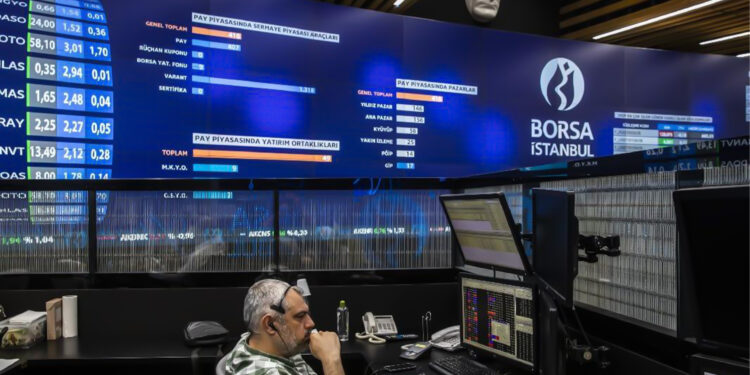The performance of the Turkish Stock Exchange has begun to improve, driven by money managers’ bets on lowering interest rates soon, after it was among the worst-performing stock exchanges since the second half of the current year.
The benchmark Borsa Istanbul 100 (BIST 100) index has fallen about 10% since the end of June as higher interest rates make other asset classes more attractive. Foreign investors’ net sales of Turkish stocks have reached $2.5 billion this year, supported by withdrawals since mid-June. May, but the market is showing early signs of recovery this month after the central bank hinted it may start easing monetary policy.
High interest rates attract money that is pumped into stock portfolios, as they are safer, while stocks remain risk assets.
More consistent inflation
“The market certainly wasn’t expecting foreign outflows to be this large, and inflation has proven to be more stable than initially expected,” Bloomberg quoted Tuvan Deriner, managing partner at asset management firm Istanbul Portfoy, as saying. “But the worst may be over: “We just need some new catalysts to emerge and become clear, such as the start of a rate cut.”
Although they remain up 30% in 2024, Turkish stocks did not completely lose the gains of the first half of the year, but they became a bear market in October, and a combination of rising prices and inflation eroded the profits of local companies, while returns from alternative and lower investments were found. Risky deposit accounts, such as lira deposit accounts and money market funds, have greater appeal among local investors.
A bear market is one that loses more than 20% of its value.
Between June 2023 and March 2024, the Turkish Central Bank raised the interest rate to 50% from 8.5%, but after maintaining the high rate for 8 consecutive meetings, the bank hinted in November that the reduction may soon be justified due to a slowdown in… Inflation.
The possibility of lower interest rates is sure to catch the interest of foreign investors and could be the “tipping point,” according to Thea Jamieson, managing director at Cheng Global Investment, who said the company is optimistic about Turkish stocks in 2025.
Minimum wage
Another signal may come when the annual minimum wage adjustment is announced, perhaps next month. President Recep Tayyip Erdogan has already pledged that minimum wage increases will continue to outperform inflation next year, but investors are hoping for a measured increase that matches the bank’s expectations. The Central Bank expects the inflation rate to fall to 21% by the end of 2025.
“Foreign investors will be watching the minimum wage rise,” Jamieson said. “If it is around 25% or less, the market will see it as positive for both inflation and interest rates in 2025. Either way, the Turkish market could rise, with or without the foreigners.” “There is sufficient local liquidity.”
But Burak Cetinker of Strategy Portfoy says the move in Turkish stocks in the second half of the year showed that foreign inflows matter, “since their outflows strongly impacted sentiment.”
The heavy selling in the second half of this year reduced total foreign inflows since the 2023 presidential elections to $486 million, and this vote attracted money into Turkish assets amid optimism about a shift towards more traditional policies (raising interest to combat inflation).
While inflation has slowed from its peak of 75.5% earlier this year to 48.6% in October, high costs of living remain a pressing and politically sensitive issue for households.
“While inflation may take longer to decline than initially expected, the central bank’s next move is unlikely to be to raise interest rates,” said Emre Akcakmak, senior advisor at East Capital International AB in Dubai. On the horizon, Turkish stocks may have bottomed and may start to recover, as current valuations look more attractive.”
Optimism about a rate cut may be evident, but even as the central bank begins to cut rates, most economists, including those at Morgan Stanley and Deutsche Bank, see this only happening gradually.



